Cloud Challenges in Insurance: Strategies for Modernizing Core Systems
Arno de Wever, EMEAL Lead for Commercial P&C Insurance at AWS, and Natalia Solé from NTT DATA discuss the transformative impact of cloud adoption on the insurance industry. In this episode of the NTT DATA Insurance Dialog, they explore core modernization, the challenges insurers face with legacy systems, and strategies to overcome complexity. Highlighting the role of partners like NTT DATA, they present key insights into how insurers can enhance agility and innovation in a rapidly changing market.
Speakers
Natalia Solé
Head of Cloud, IS & Security at NTT DATA Insurance

Arno De Wever
AWS Insurance Leader EMEA

Arno De Wever
AWS Insurance Leader EMEA

Transcription
Welcome to a new episode of our NTT DATA, Insurance Dialog. Today we have invited Arno de Wever. Hi Arno, how are you?
I'm pleased to be here. I'm Arno, I am the EMEA lead of commercial P&C (Property & Casualty) Insurance at AWS. I make sure our Insurance customers have everything they need from a cloud-based perspective, either to build based on AWS and Amazon Services or through partners, or like solution partners, like consultancy partners such as yourself.
Okay, great. Today we will focus our conversation on the big transformation that the insurance business is facing due to the challenge of the cloud. How do you foresee this transformation? How do you see that the insurers are transforming themselves to adopt cloud?
Core Modernization is still the biggest thing happening in insurance from a cloud perspective. Even though Generative AI and Customer experience take all the headlines, the actual focus of most insurance companies tends still to be on Core Modernization. There's a lot of complexity and there is a lot of legacy within the core systems at insurers and core systems are all the Policy Administration, Billing, Claims, Reinsurance system,
and we are finding that that complexity, means that it is hard for Insurers to get started. And with a lack of Cloud skills within those insurers and especially in the departments that are supposed to be doing that modernization, we see that they struggle to make progress and that is where partners such as NTT DATA come in and really facilitate and help insurers get started.
Yes. What are the main strategies that they are adopting to transform themselves?
Complexity is the big issue that these Insurers have, they normally have built and encapsulated these core systems with so many other small tactical solutions, that it becomes difficult to see the forest for the trees. So, the main thing is to have a good plan, have a good roadmap, and, feed the elephant one bite at a time.
Is that what you are seeing as well?
Absolutely. That's the key lever for this kind of transformation. And, how do you foresee the future of the insurance company based on these big transformations that they are now performing?
I foresee that there will be a move towards the Cloud. At the moment, probably less than 10% of all insurance workloads run on the cloud. If you look at core systems, it is much less than that, and it is hampering the agility of insurance and the ability that they have to create new products, or new services, or to service their customers in the way that they are expected to these days.
From a cost-efficiency perspective, it is difficult to leverage the benefits that both have with pay as you consume. We are seeing that insurers are slowly moving towards that. The way that you migrate your core systems, is that you can migrate your systems or you can modernize, so you can simply relocate or rehost a platform, or a solution into the cloud.
But you can also really re-platform or refactor solutions to take advantage of all the capabilities of the Cloud. If you have a loosely coupled set of systems that has an event driven architecture, then you see that you can do much more with the data that you generate, and you are much more efficient in the way that you consume
the storage, the network and the compute functionalities of the cloud.
Based on your experience and your background in the insurance industry, what do you think about verticalizing the technical offering for Cloud in insurance?
So before I joined AWS, I worked in the Insurance Industry, mostly within the London markets. We, from an AWS perspective, are increasingly verticalizing. So, financial services was the first industry vertical to be set up, and that has been hugely successful. An insurance company, especially one at the start of it is its cloud journey, needs guidance of what does good look like, whether you build for your solutions or you buy solutions.
So, I focus a lot on partners and making sure that whatever Insurance workstream an insurer is looking at; it doesn't have to be an insurer, it can be a reinsurer or a broker or an MGA as well of course. But whatever they are looking up that there is an offering there. So, policy administration systems to intelligent document processing from a generative AI perspective, to billing systems, to document management solutions.
So, it is important, especially around the core, be that again, policy administration, claims billing, but also rating and pricing or modeling that there are solutions that are tailored towards the industry, because the capabilities are so specific to that industry. And, from an AWS perspective, we have a lot of great partners who provide all of that.
We have enough use cases to allow all customers to build using AWS services that Industry experience, which is what I'm at AWS for, to provide the industry experience, which is really a key differentiator there.
Yes. I think that is great. In fact, when we approach a client together, and really face and cover all of the needs that they have, I think it is the right way to do it. We have some expertise. We have been working together with AWS for some important global European clients, how do you foresee these kinds of projects?
How do you think that we can work better together to provide the best services in class for the clients?
NTT DATA has great AWS expertise and is able to do things for an insurer that AWS simply is unable to, you combine that insurance expertise with that AWS expertise in a way that AWS alone is unable to do. So, you really help from an AWS perspective to bring the cloud experience to our customers.
We, from an AWS perspective, support you in things like training, helping you with a managed service provider, which you do really well and providing a number of mechanisms. For example, you have access to map funding, which is a pot of money that helps you migrate workloads that are not on AWS to AWS and makes it cheaper for the customer. Therefore, giving them more incentive to migrate those solutions from on-prem into the cloud.
So, finally, what are the main advantages that Cloud can provide to our clients from your point of view.
When an organization first looks at the Cloud, the discussion tends to be about cost. It has to be cheaper than on prem, and that is certainly achievable. You need to be careful in how you apply the cloud, and you can't use the Cloud in the same way that you use your mainframe on prem.
You need to make sure that you only have the storage, and you make sure you have your trend driven architecture so that you do not create an ‘always on’ environment. Because if you do that you are not going to see the benefits. But once you are starting to see the agility that the cloud offers, the ability to start services with the click of a button, the ability to experiment at low cost, the ability to integrate services to get access to all your data and then start to do machine learning.
That is really where the Cloud comes into its own. If all your data sits on a mainframe or, heaven forbid, multiple mainframes, how are you going to make that available for machine learning or for Generative AI? If you want to create a chatbot where you want your insurer to be able to find out when the policy expires, What coverage they have, what their renewal premium is going to be. If that sits on the mainframe, that is going to be much harder than when it sits in an S3 buckets.
And if we do not talk only about technology because we are talking about Cloud, and sometimes it is only related to technology. If we talk about business, what is your view on what will be the advantage that Cloud can provide directly to the business?
The business will see the end results. when I was at a big Insurer, it took 18 months to add a cover to a product. The underwriters were livid because they wanted to start writing that business immediately. So, a large part of that is because a change needed to be made in multiple systems. It needed to be tested end to end, and it needed to go through release cycles which were once every six months.
The ability to say we are going to have technology that understands the preferences of the customer and is able to communicate with the customer in a more personalized style, or were able to predict, churn, for example, the likelihood that an insured is going to renew or not renew that policy, and being able to do something about that, those business outcomes are all there because the data is there to support that.And the processes, the tools are there to make use of that and turn that into actions. The Cloud has pretty much made that possible.
And what will be next in the Cloud adoption?
think the Generative AI wave is only just starting. We are moving from pilots and people trying things out into productionization. So, we are seeing a lot of identification of automation capabilities and then consolidating those into actionable automations.
And, automation can mean a prediction of mach ine learning workflow, but it can also mean a Generative AI workload weare also seeing a lot happening in Embedded Insurance technology. And again, especially the cloud makes it possible to gather all those data points from wearable devices for example, to be able to create an Embedded Insurance offering, the ability to pay as you drive, or be it an insurance where you can basically on a smart watch, switch something on or off.
All that is now possible and especially from an Embedded Insurance perspective, we're expecting to see a growth of 25% per year. So that is going to take from about 1% of of Insurance premiums to around 30% of Insurance premiums in ten years' time. So, there are a lot of things happening. There is going to be a lot of transformation happening within the insurance markets.
One specific ask in Cloud Transformation is Applications Modernization. What do you think is the key lever for modernizing the applications in the insurance industry?
A hard one.I used to own a number of applications in a previous role and modernization of applications is hard. The older they are, the harder it becomes. The first thing to look at is the roadmap, or or the lifespan of the application, and that is measured from a technical perspective, is there a limit to hardware or software support as well as from a business perspective? is the line of business still being written? Do we have another solution that can handle this specific capability? And you must decide whether you want to run something off or put it into a lift and shift it onto the cloud. Maybe there is an option of whether you want to refactor some of the code to be able to merge some of the capabilities or bring the data team to a wider ecosystem. Sometimes it is a simple replace, and then you can migrate and replace, or you can replace and run off from an old application.
The modernization process is dependent on what the solution requires, from an Amazon perspective we call that; diving deep and working backwards from the customer, so that there is no can solution to a problem. We know the complexity that Insurers have, and we know that we need to really look at identifying what the right solution is. We have all the tools available to help these Insurers do whatever the right solution is, be that a simple lift and shift to the cloud or rewriting the application in a more modern language.
And based on the experience of our common projects, from your point of view, what are those key differentiators that NTT DATA has?
NTT DATA has experience within the insurance industry and the knowledge of what is possible with AWS. That is a killer combination to be able to give the insurers the right solution and help handhold them or take some of that workload away from them to get to where they want to go. And by using those AWS mechanisms, such as map funding, that helps make it affordable from an insurance perspective as well.
Thank you very much Arno for being in this episode. It has been a very interesting dialog. We really appreciate your words and thank you so much for being with us.
Well, thank you Natalia for having me here, it has been a pleasure. And, of course, thanks to NTT DATA for inviting me as well.
Thank you.



